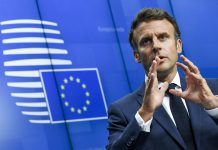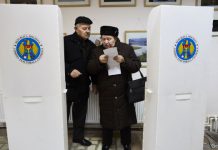Vasile Botnaru: Naturally, today I have proposed myself to analyze, as if it was a hologram set on freeze, the recent visit of the US vice-president Joseph Biden in the Republic of Moldova. In order not to burry the essential significances of the moment in the heap of various rancorous comments. My today speakers are the analyst Anneli Ute Gabanyi from Berlin and the deputy minister of the Ministry of Foreign Affairs and European Integration, Andrei Popov.
Radio Free Europe: Mrs. Gananyi, perhaps things are better seen at distance. For this reason I would ask you firstly to tell us, what did you see?Anneli Ute Gabanyi: „It seems to me that the symbolical significance of this visit cannot be underestimated. I believe and I think that even the common moldovan citizen noticed, that unlike other visits, including those in Finland and Russia, Mr.Biden took a bath” in public, that is to say among people, speaking to the citizens in a very friendly way and full of support. I believe it had an important impact, an impact upon people who were asked and have been supported in their effort for reforms. An effort that will not be easy at all and Mr. Vice-president has mentioned about it. Also Mr.Biden expressed the support for the current government coalition and for that moral obligation this coalition, the politicians, and the political elites from Moldova have undertaken in order to pursue this way, a support for the coalitions unity and stable governance that could guarantee the success of the reforms.
Radio Free Europe: But having such supporters, if you screw up, then you are in a big trouble. Isnt that right Mr. Popov?Andrei Popov: „Beyond the historical character of this visit that has been already mentioned, it is clearly an invitation to responsible, stable and efficient governance. Beyond those pertinent comments in regard to the symbolical and historical meaning of this unprecedented visit, indeed it involves a high American official și the second person in the American administration, who has visited our country during 20 of independence. I too believe that during this year we could expect a continuance in what concerns both, the visits and the progresses on the Moldovan – American agenda. The fact that Mr. vice-president came to Chisinau and especially the messages he delivered both here and in Moscow in what concerns the relationship between the US and Russia and how it reverberates over Moldova, it is a natural thing. Two years ago Mr. Biden has launched the process of resetting this relationship and it shows results. The Russian president Medvedev has ratified an agreement that allows the transition of the supply loads of the US army in Afghanistan through Russian territory. That is very important for the US and has been highly appreciated. Thus, the policy of resetting the Russian și American relationship, avoiding the ideological aspect of it, has shown some results. The US expresses its appreciation while at the same time being firm and categorical. There is no way we could speak of re-division of the spheres of the influence. Mr. Biden has talked about it at his meeting with Prime și minister Filat, also during the discussions with interim President Lupu, including in his public address. Spheres of influences” is a notion that belongs to the 19 century. The US will not accept such discussion. Moldova is being taken into account; the administration from Chisinau is treated as a serious and credible interlocutor. It is recognition of transformation and modernization accomplished by the Alliance for European Integration during the last year and a half.”
Radio Free Europe: Speaking of the notion resetting”, as we know it belongs to Mr. Biden. Mrs. Gabanyi, it is considered that Americans, a lot of Americans, were by definition in opposing, antagonistic relationships with Moscow. Whereas here Mr.Biden comes and says: do not expect our support for any antagonisms towards Russia. On the contrary, look for common language, including on transnistrian issue. What does it actually mean, Mrs. Gabanyi?Anneli Ute Gabanyi: „There is one thing we should understand and Andrei Popov has stressed it. After Bush era, by this so called resetting began a re-evaluation and a change of the policy between the US and Russia. It was a necessary thing to do, even though a lot of states, including both, NATO and EU member states, as well as some neighbor states, were concerned because of this resetting thinking and being afraid it might disadvantage them somehow. I think the visit of Mr. Biden and the way he presented the position of the US, specifying those 20 years of independence a part of the USSR, mentioning also Georgia, Ukraine and Belarus, that is those states where Bush policy hasnt shown brilliant outcomes, he pointed out that Moldova, as part of this new post-soviet states comparison, went well. This is a positive message for Moldova, where I guess there is a certain consensus between politicians that deal with foreign affairs – that Moldova must have a balanced policy, it must become closer to the EU decisively, as it is a vector of modernization, it must become a pro-west country that participates within NATO Partnership for Peace, and at the same time being non-antagonistic to Russia. In this context, I believe the interests and the principles of the US foreign policy and those of Moldova may coincide.”
Radio Free Europe: That is to say there is no more need to recruit the old components of GUAM against Russia. Then, where does the frustration of communists, for example from Chisinau, comes from, since they continue to defend Russia?Anneli Ute Gabanyi: „It is very simple. First of all it comes from the so called Pavlovs reflex și hateful salivation at any mention of the US or any of its representatives. Second, it is the fear of losing their electorates support. To whom the appearance of Joe Biden on television, having a warm tone, mentioning about Moldovans that have a successful career in the US, or even about Natalie Portman and her Moldovan grandparents, represent a threat to the Party of Communist.”
Andrei Popov: „I would like to speak more about the endeavor to avoid ideology in the relationship between Russia and the US and what is the lesson we need to learn out of it. The message of Mr. Biden was to encourage a realistic approach of the foreign policy. In fact if I synthesized, it would mean: on one hand do not indulge in illusions, on the other hand do not disillusion. That is to say, do not indulge in illusions that someone will start a war for us or will do our homework. It depends solely on us how we advance on our way to the European Union. And first of all it depends on the quality, profoundness and on the rhythm of the reforms. But at the same time we should not disillusion that we are left alone. Moldova must not confront good relationships with Russia to those good relationships with the US. The process of European integration and that of transnistrian conflict resolution are self-sustaining. We are a small state, and for such states foreign policy mistakes, some resulting out of a non-realistic approach, cost a lot. As regarding those envies, frustrations or comments, to me they are unworthy to politicians and state officials. The fact that Moldova entered into the US political attention radar, is a success of everybody. As you have noticed probably, immediately after the plane of Mr. Biden has land taken off, interim President Marian Lupu and Prime Minister Vlad Filat along with the ambassador Asif Chaudhry attended a show on television. It was an atmosphere we have been waiting for a long time, an atmosphere of understanding, of communication, of embracing common interests și for Moldova to have stable governance and to make capital out of this unprecedented opening that our external partners show. And the thing they keep on saying is: to help you, help yourself.”
Radio Free Europe: Mr. Diacov said it even more flexible: help us to help you. Andrei Popov: „Help us to help you și that is the request of our friends. This visit helps us a lot to focus the attention upon Moldova and to show the American investors and businessmen, also to the congressmen, that Moldova is a country deserving to be visited. This visit is helping us to change the perception of what Moldova is. Here in Chisinau…Unfortunately, few appearances in the western media about Moldova are associated with negative phenomena și human trafficking, poverty, recent statistics presenting us as the most drinking nation in the world, though I am convinced it is not so, it is a subjective and regrettable mistake. That is why this visit that took place, especially on a fantastic, sunny spring day, show that out of Moldova warmth comes too. Including the message of Mr. Biden addressed to the people of Moldova, referring to those coming from Moldova who succeeded in the US and through out the world, the new mayor of Chicago, Rahm Emanuel, former president counselor, the famous Natalie Portman, all of them have Moldovan origins. At the same time it was a sign including for us: to believe in our country, to believe in our powers; that we deserve more, but that this more” depends firstly on us. And at this point I would like to come back to domestic agenda that is being imposed by such kind of visits and its external valences about which the American vice-president has also referred to.”
Radio Free Europe: If you had to synthesize what is it for us to do in order to correspond to this favorable appreciations coming from the very American vice-president? Andrei Popov: „Firstly, we have to understand what things we can administer and what things do not depend on us. The increase of quotas on wheat, meat and oil on international markets that leads objectively to the increase of prices in Moldova is something beyond the power of influence of the government from Chisinau. It is a historical conjunction that the international economy suddenly began to improve in 2001 and all the countries in the region began to grow. Then in 2009 the economic crisis hit Europe. There were 8 years of regional prosperity. In the opinion, often parochial and narrow of the Moldovan citizens as voters, this regional stability that dominated the evolution of the entire region from 2000 till 2009 unfortunately was subjectively and wrongly associated with the so called achievements of the former government. While now everybody passes trough crisis. And we have to learn to distinguish what is in the governments influence and on that to bring the government to account. If we need to define the priorities of our agenda, then it is și europeanization, modernization of Moldova, which means supremacy of law, healthy investment climate, independence of justice, these are at stake pillars the success of a country is based on. We have the responsibility to be a model and to prove that a democratic, European and coalition governance can be efficient meeting in the best way citizens interests. I am absolutely convinced that if we succeed to carry on with this path of stability, in 3-4 years Moldova will be a completely different country and the self-perception of Moldovans about themselves will be a better and more optimistic one. This visit encourages us on that and gives us a hope. The way will be able to make capital out of it depends firstly on politicians and state officials, who need also the understanding of the media and of the citizens.”
Radio Free Europe: Mrs.Gabanyi?Anneli Ute Gabanyi: „The deputy minister is perfectly right. I would add that a Government of coalition is not an easy thing to accomplish. The Moldovan citizens have to understand that to govern in a coalition doesnt mean that all the partners, all the parties of this coalition must have the same opinion. There are other western countries, even Germany, where within coalition governments appear differences. But those voting for the coalition to form or to maintain, also may vote strategically. In that sense that whether they want the coalition, but they dislike a party of this coalition, they should vote with others, but this doesnt meant that those from the party they dislike are enemies. They are opponents while at the same time being partners in one vision. That is a thing to be understood both by politicians and by citizens.”
Radio Free Europe: Nevertheless, Mrs. Gabanyi, there are subjects that from the beginning generate antagonisms. For example, Moldovas neutrality, that within the coalition is being approached differently.
Andrei Popov: „There is an important remark I need to make at this point. Both the agreement for Alliance constitution and the government program contain important references to the neutrality status, but additionally it is completed with the constitutional provisions that this neutrality has to be real and not fictitious. We need to resume and later on to finalize the process of evacuation of the Russian troops munitions from Moldova.”
Anneli Ute Gabanyi: „I tend to think that the message of Mr. Biden concerning this topic has been overlooked by Moldovan media. Perhaps it is not at all accidental that this time, Mr. Biden besides visiting Moldova, went firstly to Finland, that is a neutral state and which neutrality especially before 1989, respectively 91, was frequently seen by the West in a slightly negative way. I followed the events in Moldova and what I have noticed in discussions between politicians, as well as between observers, was the idea that in order to adhere to the EU a state should be first of all a NATO member. Three years ago I have launched and published a project in Vienna, based on the example of Austria from 1995 that succeeded to get rid of foreign troops on its territory, becoming a neutral country. It might serve as an example for the former soviet space. The main idea of the project relating to neutrality was that Moldova having its neutrality declared and accepted by its people may be taken as an example by both Georgia and Ukraine, for the Russian Federation to withdraw its troops. Consequently, not to put any pressure over these countries and to hinder their eventual adherence to NATO. Unfortunately the elections from Ukraine as well as the 2008 war in Georgia and the followed-up events have shattered my theory. I think Mr. Biden has clearly delivered his message to the Moldovans, the politicians and the public: see, we do not see anymore your countrys neutrality as a negative thing. Therefore the US actively supports the integration of Republic of Moldova, its importance in the region. I think it is another reason for tempering and normalizing the discussions on neutrality. We shall not forget though, that this neutrality has not been declared so far because the Moldovans did not know where they belong and were unwilling to upset Russia. The neutrality is declared to be active, that is for the withdrawal of the soviet, occupying, Russian troops from the territory of Moldova. Since 1994 the Russian troops on the territory of the Republic of Moldova are illegal.”
Radio Free Europe: Thus the concept of neutrality is in evolution. Beg your pardon for this licentious language, but should we interpret the message of Mr. Biden as saying that we do not consider you anymore as a country pending there somewhere and that might later on reach someones courtyard.Andrei Popov: „I would interpret it this way: the current external context is extremely complicated. States have too much defiance to confront and they cannot make it on their own. Not even the US, they also need to cooperate with Russia in solving extremely important issues și Afghanistan, Iraq, nonproliferation, fight against terrorism. Even a country like Moldova has its own resources to resist the defiance it confronts. That is why it is very important to think carefully what issues we need to concentrate on and what we should avoid and not to exacerbate artificially. At this moment the issue of whether Moldova has to renounce at its neutrality or not is not relevant. What is relevant is that we need to cope with internal and external challenges. We need to assure a maximum cohesion within the Moldovan society. We need to maximally support the absolute objective of our internal and external policy și the European integration. Under no circumstance shall we break this national consensus because of topics based on ideology. One of which is either we should or not adhere to NATO. Mr. Biden called for a realistic and pragmatic approach și deal with real problems, do not make up new problems.
Anneli Ute Gabanyi: „I also think the message was: we are not against neutrality. We do not necessarily encourage you to enter NATO, as it was in the case of Georgia. Therefore, take care of your real problems. For us your neutrality is not an impediment, as some may say. And definitely it is not an impediment for your European integration.”
Radio Free Europe: Therfore, Biden did not ask Chisinau something extraordinary? It is the same agenda that Mr. Popov makes reference to, the one specific for our European integration course?Anneli Ute Gabanyi: „In a way it is, since it is about European integration, a way to modernization. What I keep questioning myself about is to what extent there is a connection between the transnistrian conflict and the long-term resolution of issues such as și corruption, human trafficking etc., issues that always appear in the appreciations of the West when it come about Moldovas obligations. If a country cannot control its entire territory, neither the borders as it should, to what extent it can control clandestine migration, or the justice, or the customs etc. I think the West should be aware of how important the resolution of the transnistrian conflict is and to take decisive steps in that sense.”
Andrei Popov: „I think it is aware of that. But it does not accept the old approach according to which the conflict was taken as an excuse for the lack of progresses in justice, business, and corruption. The Russian troops and the regime of Smirnov are not a reason for the justice not to work and the corruption to thrive. Our civil servants are corrupt. But the causal connection is the following: if we accomplish everything that depends on us, trough change and modernization, trough Europeanization of the domestic framework, we will make out of the Republic of Moldova a completely different negotiator, both internally and externally. Internally we will be more attractive for the people from the transnistrian region, externally we will succeed to capitalize in a better way the support of our international partners we enjoy for now and to neutralize the negative influences, to reduce the numbers of those interested in the status quo. For that we need to understand what are the priorities and the resources we have. We cannot solve everything in an instance. Justice, fighting with corruption, stable and efficient government, these are some of the essential priorities. And if we continue with this process the context for the resolution of the transnistrian conflict will be a better one.”
Radio Free Europe: And then Mr. Biden will definitely come back, as he promised. We came to the final point of the todays show where the guest were, the expert Anneli Ute Gabanyi, Berlin and the deputy minister of Foreign Affairs and European Integration, Andrei Popov.
Unofficial translation







